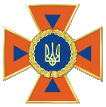Historical stages of our University
 Lviv State University of Life Safety began its history with a small educational institution - Kyiv courses for improving the fire brigade officers of the Ministry of Internal Affairs of the USSR. The replenishment of fire brigades in the postwar period was carried out mainly from the number of soldiers and officers who returned from the front.
Lviv State University of Life Safety began its history with a small educational institution - Kyiv courses for improving the fire brigade officers of the Ministry of Internal Affairs of the USSR. The replenishment of fire brigades in the postwar period was carried out mainly from the number of soldiers and officers who returned from the front.
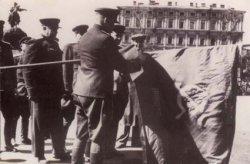 In order to improve their professional level in the country, a number of retraining courses were organized. In particular, such courses were established in October 1947 in Kyiv on the basis of the first sergeant school of the UPO of the Regional Department of the Ministry of Internal Affairs of the Kyiv region with a training period of 10 months (prevention) and 15 months (branch commanders) with a total of 100 students. In December 1947, Lieutenant Colonel VA was appointed head of the courses. Dronov (since February 1948 - Colonel), and his deputies - Captain FL Belik and Lieutenant Colonel BM Gorbatenka. By February 1, 1948, the courses were staffed by the teaching staff and classes began within a month. On April 18, 1948, the courses were awarded the Battle Flag, and on May 8, 1948, the personnel were brought to the Military Oath for the first time.
In order to improve their professional level in the country, a number of retraining courses were organized. In particular, such courses were established in October 1947 in Kyiv on the basis of the first sergeant school of the UPO of the Regional Department of the Ministry of Internal Affairs of the Kyiv region with a training period of 10 months (prevention) and 15 months (branch commanders) with a total of 100 students. In December 1947, Lieutenant Colonel VA was appointed head of the courses. Dronov (since February 1948 - Colonel), and his deputies - Captain FL Belik and Lieutenant Colonel BM Gorbatenka. By February 1, 1948, the courses were staffed by the teaching staff and classes began within a month. On April 18, 1948, the courses were awarded the Battle Flag, and on May 8, 1948, the personnel were brought to the Military Oath for the first time.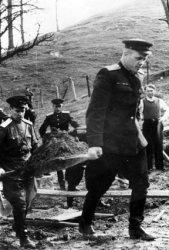
The first graduation of 46 students took place in January 1949. In the same year, the number of students increases by 100 people with a training period of 11 months. In July 1951, the training profile changed and they were renamed the Kyiv Training Courses for Officers of the Military Fire Brigade of the USSR Ministry of Internal Affairs. The variable staff was then staffed by sergeants and officers of the paramilitary fire brigade. After graduation, the cadets were awarded the rank of "junior lieutenant". The formation and development of courses was facilitated by the work of employees Ya.G. Sukhomlin, MV Kolesnikov, VI Razgildeev, DA Sinitsa, SM Kozlov, MM Kondrashov, VI Finogenova, MP Trachuk and many others. Special emphasis should be placed on the contribution of Major-Engineer Ya.Ya. Shcherbiny, who fruitfully combined the teaching of subjects with scientific and innovative developments. Thus, in 1951 he developed a system of intake and supply of water to the scene of the fire using an ejector system, which was supported and praised in the UPR of the Ministry of Internal Affairs of Ukraine. A historic milestone was the order of the USSR Ministry of Internal Affairs of July 22, 1952 to establish a Kyiv Fire and Technical School with a staff of 344 permanent staff and 840 cadets on the basis of the Kiev training courses for IDP officers of the USSR Ministry of Internal Affairs. A building on the street is being built for accommodation. Uritsky (now Solomyanskaya Square). Today there is the central building of the National Academy of Internal Affairs of Ukraine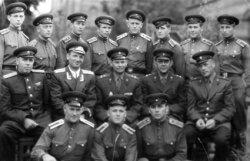 Colonel of the Internal Service Engineer OT was appointed the head of the Kyiv school. Zamostiev, and his deputies - Major of the Internal Service VM Katunin, lieutenant colonel of internal service SM Zelenyuk and lieutenant colonel of the quartermaster's service BO Donova. Recruitment of cadets was carried out from among civilian youth aged 18-23 years, who had secondary education or 9 classes and was fit for health, as well as from the ranks of sergeants and privates of the paramilitary fire brigade, regardless of position, age up to 30 years and education not lower than 8 classes. In August-September 1952, the first recruitment of cadets in two divisions, with a term of study of 2 years. Major of the Internal Service SM was appointed division commanders. Kozlov (Deputy Senior Lieutenant of the Internal Service MD Golubeyko) and Major of the Internal Service SF Zagornov (Deputy Major of the Internal Service IM Batenkov).
Colonel of the Internal Service Engineer OT was appointed the head of the Kyiv school. Zamostiev, and his deputies - Major of the Internal Service VM Katunin, lieutenant colonel of internal service SM Zelenyuk and lieutenant colonel of the quartermaster's service BO Donova. Recruitment of cadets was carried out from among civilian youth aged 18-23 years, who had secondary education or 9 classes and was fit for health, as well as from the ranks of sergeants and privates of the paramilitary fire brigade, regardless of position, age up to 30 years and education not lower than 8 classes. In August-September 1952, the first recruitment of cadets in two divisions, with a term of study of 2 years. Major of the Internal Service SM was appointed division commanders. Kozlov (Deputy Senior Lieutenant of the Internal Service MD Golubeyko) and Major of the Internal Service SF Zagornov (Deputy Major of the Internal Service IM Batenkov).
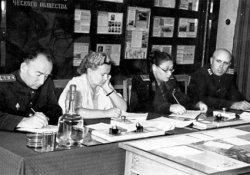
On November 1, 1952, the cadets began classes in the following cycles: social sciences (headed by Lieutenant Colonel OM Nikolaenko); fire tactics (Chief Major of the Administrative Service PM Platunov); fire prevention (Chief Major YG Sukhomlin); fire equipment (chief engineer-major of the internal service Ya.Ya. Shcherbyna) and general education (chief captain MV Kolesnikov).
The military cycle was established in December 1953. It was headed by Major of the Internal Service SF Zagornov. Among the teachers of fire tactics was a technician-lieutenant of the internal service P.M. Desyatnikov - the future major general of internal service, the chief of GUPO of the Ministry of Internal Affairs of Ukraine.
At the same time, 11-month courses continued to operate at the school, which were disbanded in June 1953. On August 30, 1953, the entire staff of the school was brought to the Military Oath, and on October 1, classes began with the cadets of the new set with a three-year term of study.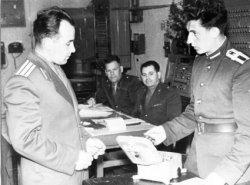 In April 1954, 85 people were selected from among the 2nd year cadets for early graduation from the school.
In April 1954, 85 people were selected from among the 2nd year cadets for early graduation from the school.
From May 4 to 10, 1954, the Kyiv Fire and Technical School was relocated to Lviv and, in accordance with the order of the USSR Ministry of Internal Affairs, it was renamed the Lviv Fire and Technical School of the USSR Ministry of Internal Affairs.A historic building in the central part of Lviv was provided for the location of the school.
In 1955, Colonel-Engineer of the Internal Service B.Ya. Kolyadinsky. The first graduation took place on July 12, 1955. Then 179 graduates were awarded the special rank of lieutenant technician of the internal service. In the same year, the order of recruitment of cadets remained the same, but the education of entrants had to be at least 9 classes, and practitioners age limit was limited to 26 years.
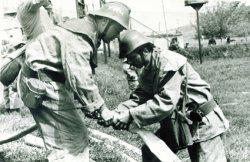
Graduates of the school in 1957 were given a new form of blue without shoulder straps, and identification marks were located on the buttonholes. This form lasted only a year. All cadets enrolled in the school in 1958 had a secondary education. In 1959, changes were made to the structure of the school - the political department was liquidated, and in 1960, 22 officers and 6 sergeants and privates were transferred to the category of workers and employees. This year the school is re-subordinated to the Ministry of Internal Affairs of Ukraine.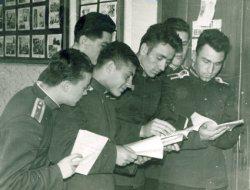 In 1961, the school organized a correspondence department with 75 students in three courses.
In 1961, the school organized a correspondence department with 75 students in three courses.
After the relocation to Lviv, the staff of the school made a lot of efforts to reconstruct the existing premises, equip the territory and make them fully suitable for the educational process. In this creative work with initiative and enthusiasm worked: Ya.Ya. Щербина, К.Т. Tiptsov, IE Воробьов, М.П. Trachuk, MI Мельничук, В.М. Yermakov, TI Kalmikova, VG Burkin, A.P. Grachev, VI Zaikin, MO Терещук, О.П. Дворянцев, В.М. Yakushev, VP Чижов, М.А. Khoroshok and many others, whose names are inscribed in golden letters in the history of our school. In 1962, Colonel of the Internal Service M.I. She cracked. In 1965, it was decided to increase the number of cadets and reduce the period of study from three years to two and a half. The following year, the school was subordinated to the Department of Educational Institutions of the Ministry of Public Order of the USSR and was renamed the Lviv Fire and Technical School of the USSR MOGP.
In 1970, Colonel of the Internal Service VM was appointed head of the school. Cuckoo. At his initiative, the reconstruction and arrangement of internal premises and corridors of the school, classrooms and classrooms, laboratories and lecture halls began.
Since 1974, Colonel of the Internal Service A.V. Sevruka.
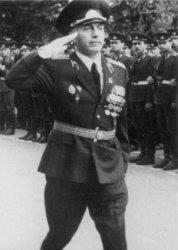
In connection with the changes in the area of the premises and the territory of the school in 1975, further development and improvement of its educational and material base began. Creatively and selflessly in this work showed themselves AS Kosivchenko, IL Bilenko, VM Yermakov, VG Burkin, OS Lozovy, VF Butko, V.Kh. Sparrow, G.Ya. Kozlovsky, IV Yakovenko, VI Олександрров, А.А. Shadrin, S.P. Штепа, В.П. Pastukhov, AI Харчук, О.С. Kalinin, J.J. Corn, S.S. Timchishin, VM Makarenko and many others. During 1975-1980 there were changes in the staffing of the school, in particular, a number of new certified positions were introduced, which were filled by experienced workers. Sevruk 459 personnel of the school provided fire safety of the Olympic facilities in Tallinn, where the sailing regatta of the XXII Olympic Games was held. For exemplary performance of this task, the school was awarded the Diploma of the Presidium of the Supreme Soviet of the USSR and the Diploma of the Organizing Committee of the 1980 Olympic Games in Moscow. The best cadets and officers were awarded government awards, badges of honor, diplomas.From June 19 to August 9, 1980, as part of a separate battalion under the leadership of the head of the school, Colonel of the Internal Service A.V. Sevruk 459 personnel of the school provided fire safety of the Olympic facilities in Tallinn, where the sailing regatta of the XXII Olympic Games was held. For exemplary performance of this task, the school was awarded the Diploma of the Presidium of the Supreme Soviet of the USSR and the Diploma of the Organizing Committee of the 1980 Olympic Games in Moscow. The best cadets and officers were awarded government awards, badges of honor, diplomas.
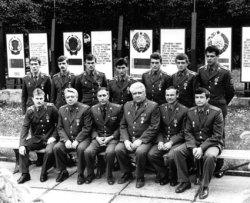
In 1983, Colonel of the Internal Service A.S. Kosivchenko Under his leadership, new measures have been introduced to develop and improve the material and technical base of our school.During 1983-1988, the fourth floor of the main building, where 4 divisions were located, was designed and added. The colonels of the internal service R.I. Kostyuk, VF Zhelizko, lieutenant colonels of internal service OM Мельничук, Є.М. Ilnytsky, OM Fitisov, MT Hamster, ZV Lavrovsky and cadet V. Sabat. teachers VG Minkovich, Ya.F. Kovalishin, VM Burilo, IB Fedyuk, IV Piskova, VV Kovalishin, BS Shtangret, VI Hrypyak, VF Karo et al. Through their work, they contributed to the improvement of the training and material and technical base.
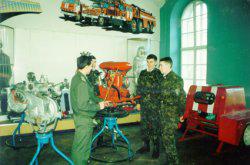
In March 1984, the school switched to a two-year program of study and began to be staffed only by persons under the age of 27 who had served in the army. Bilenko, chief of the fire and tactical cycle, lieutenant colonel of the internal service AF Lebid, teacher major of the internal service MV Sudintsyn and 9 cadets were directly involved in the aftermath of the Chernobyl accident. For courage and selfless work, they were all awarded the medal "For Courage in Fire."In 1988, a new curriculum was introduced with a training period of 2 years and 10 months.
From February 21 to August 8, 1989, the personnel of the school in three temporary consolidated battalions (200 people each) performed a peacekeeping mission to protect public order in Nagorno-Karabakh. The battalion commanders were appointed Colonel of the Internal Service A.S. Kosivchenko, lieutenant colonel of internal service BV Kolodiy, lieutenant colonel of internal service VP Пастухов. For exemplary service, Colonel of the Internal Service A.S. Kosivchenko, lieutenant colonels of the internal service BV Kolodiy and E.M. Ilnytsky was awarded medals "For Distinction in the Protection of Public Order."
The order of the head of the school of August 24, 1991, first issued in Ukrainian "On the democratization of the educational process" became historic and important for the school. According to this order, subjects of party-political orientation were removed from the curriculum and the activities of all parties and political formations were prohibited. In connection with the untimely death of Colonel of the Internal Service A.S. Kosivchenko, in December 1991 the head of the school was appointed Colonel of the Internal Service BM Gritsaya.
The turning point in the life of the school, as well as the state as a whole, was the Act of Independence of Ukraine. The teaching staff of the school initiated and was the first among the educational institutions of the Ministry of Internal Affairs of Ukraine in 1993 to teach all subjects in the Ukrainian language.
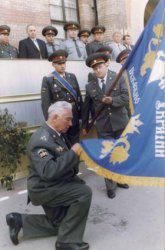 In 1993, the position of rector of the school was introduced, to which the head of the school, Colonel B.M. Gritsaya. On his initiative, new areas of activity of the school staff in improving the material and technical base. In this work, Colonel of the Internal Service OI Vorobyov, lieutenant colonels of the internal service VV Здоровик, О.А. Гаврилко, З.В. Lavrovsky, OS Nazaruk, S.I. Gagarin, A.D. Kuzyk, Major of the Internal Service TE Cancer and others.In 1994, the reconstruction of the chapel began, which is located on the territory of the school and has long been used for other purposes. At the same time, the construction of a training center in the village began. Tsuniv, Horodok district, Lviv region, to hold a camp meeting with freshmen. On behalf of the Lviv Regional State Administration in 1995 the school was awarded a new flag with Ukrainian symbols.
In 1993, the position of rector of the school was introduced, to which the head of the school, Colonel B.M. Gritsaya. On his initiative, new areas of activity of the school staff in improving the material and technical base. In this work, Colonel of the Internal Service OI Vorobyov, lieutenant colonels of the internal service VV Здоровик, О.А. Гаврилко, З.В. Lavrovsky, OS Nazaruk, S.I. Gagarin, A.D. Kuzyk, Major of the Internal Service TE Cancer and others.In 1994, the reconstruction of the chapel began, which is located on the territory of the school and has long been used for other purposes. At the same time, the construction of a training center in the village began. Tsuniv, Horodok district, Lviv region, to hold a camp meeting with freshmen. On behalf of the Lviv Regional State Administration in 1995 the school was awarded a new flag with Ukrainian symbols.
In January 1999, Colonel of the Internal Service MM was appointed rector of the school. Capricorn. A new stage of formation and development of our educational institution has begun. The main educational and scientific achievements of this period are the Order of the Cabinet of Ministers of Ukraine according to which on June 21, 2001 the Lviv Fire and Technical School of the Ministry of Internal Affairs of Ukraine was reorganized into the Lviv Institute of Fire Safety of the Ministry of Internal Affairs of Ukraine.
According to the Decree of the President of Ukraine of January 27, 2003, our Institute came under the Ministry of Emergencies and Protection of the Population from the Consequences of the Chornobyl Accident.
In order to provide qualitatively new training for specialists of the Civil Protection Service of Ukraine and the desire to join the European educational standards of the Bologna Process, on March 29, 2006 the Lviv Institute of Fire Safety of the Ministry for Emergencies of Ukraine was reorganized into the Lviv State University of Life Safety.
In order to bring the structure of the University to the standards of higher education in November 2011, the University includes educational and scientific institutes of fire and man-made safety and civil defense, and later educational and scientific institutes of psychology and social protection and postgraduate education.
In May 2012, the structure of the University included the Higher Vocational School (Vinnytsia). Most of the graduates of the school can continue their studies at the University and obtain the next level of education.
The university managed to take the first steps towards reforming the departmental education system and ensure the principles of continuity and gradualism. To provide conditions for full general secondary education and guarantee social protection for orphans, children deprived of parental care, children whose parents died in the line of duty, children of employees of the State Emergency Service of Ukraine and gifted youth in May in the same year the Lyceum of Civil Defense (Vinnytsia) was established.
Since 2008, Lviv State University of Life Safety is a member of the European Fire Service Colleges Association (EFSCA) of the European Union. Such cooperation allows to adopt the experience of European countries in responding to and preventing emergencies, to develop common standards and concepts of safety, to exchange modern scientific and technical achievements and experience in training.
At the final meeting of the Summit of the Association in May 2015, representatives of the school were awarded the "Silver Medal" for significant contribution to the development of international mechanisms for human security, integration of the Ukrainian civil protection system into European and significant work on development and expansion of the European Association. work in the field of human security.On September 20, 2013, the Rector of the University, Professor Mykhailo Kozyar, signed the Magna Charta Universitatum at the oldest educational institution in Europe - the University of Bologna (Italy). This document brings together more than 800 leading universities in the world, which are recognized centers of knowledge, science and culture. This document sets out the fundamental principles that guide universities to ensure the development of education, the innovation movement and the establishment of close links.
Taking into account the specifics and peculiarities of the tasks assigned to the units of the Civil Service of Ukraine for Emergencies, in March 2015 the Government Resolution decided to establish a military department for training citizens of Ukraine who have or obtain a higher education degree not lower than bachelor's degree state of health and moral and business qualities, according to the training program of reserve officers.
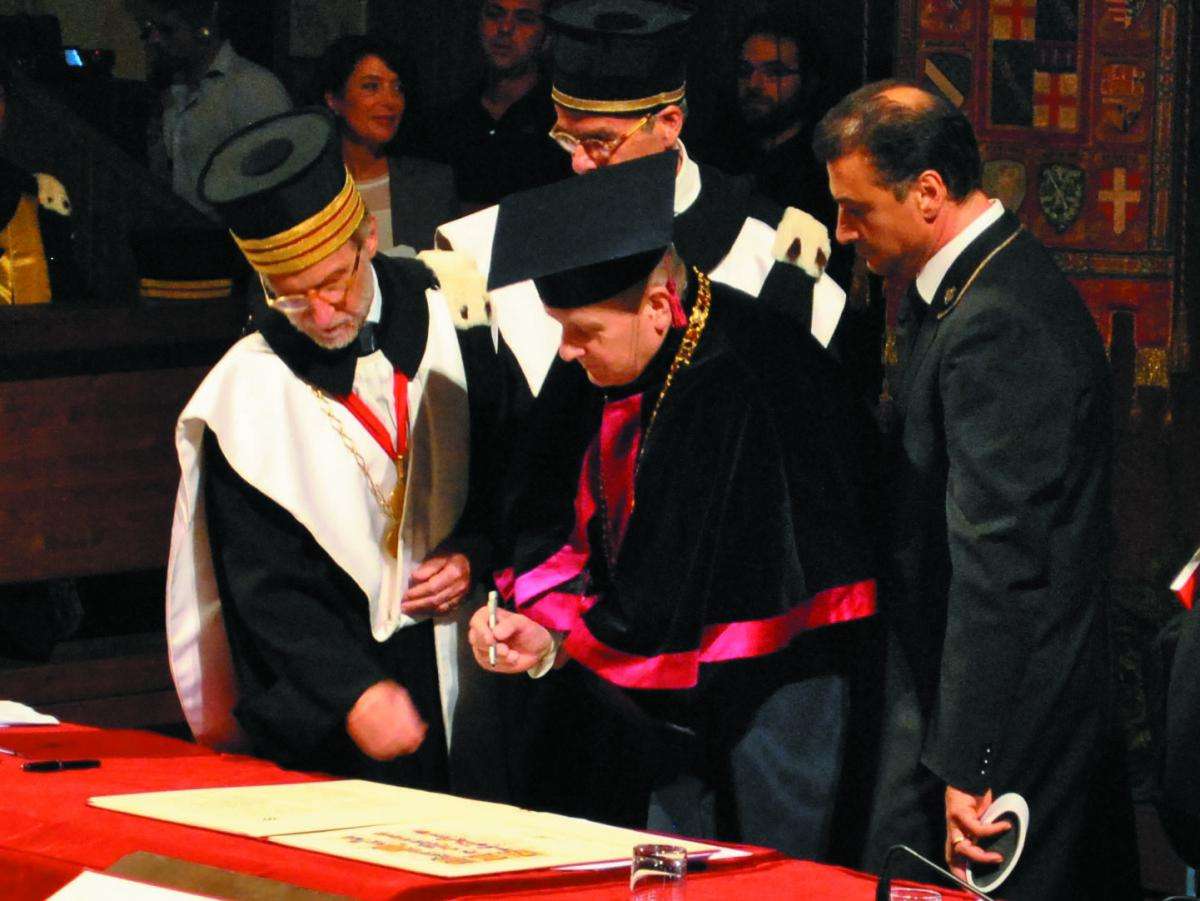
On April 23, 2021, the Rector of the University, Professor Myroslav Koval, signed the Grand Charter of Universities MCU2020. The Magna Charta Universitatum, a declaration and approval of the basic principles on which the mission of universities should be based, was signed in 1988 on the occasion of the 900th anniversary of the University of Bologna. The first principle was independence: research and teaching should be intellectually and morally independent of all political influences and economic interests. Second, teaching and research must be continuous, and students seek knowledge and better understand it. The third principle defined the university as a place for free research and debate, characterized by openness to dialogue and rejection of intolerance. The principles set out in the Magna Charta Universitatum are the same today as they were in 1988, and they are a necessary precondition for advancing a person through research, analysis and sound action. Therefore, the Board of Governors of the Grand Charter Observatory has decided that MCU 2020 will be launched during an online event on June 16-17, 2021.According to the consolidated ranking of higher primary institutions of Ukraine, the University is recognized as the best in its field. To compile the rating, the opinion of the most authoritative experts and mass media was taken into account by UNESCO, "Top-200 Ukraine", "Compass" and "Webometrics". Each of them applies different criteria for evaluating higher education institutions. We were also recognized as a leader in national education for many years of innovative pedagogical activities to modernize education in Ukraine and a leader in the national rating system of higher education institutions in Ukraine. The educational institution was awarded gold medals in the nominations "Information IT - technologies in higher education", "International cooperation in education and science" and "Publication of textbooks and manuals of the new generation for specialized higher education institutions". The University was awarded the Diploma of the Ministry of Education and Science of Ukraine for active career guidance work among young people.
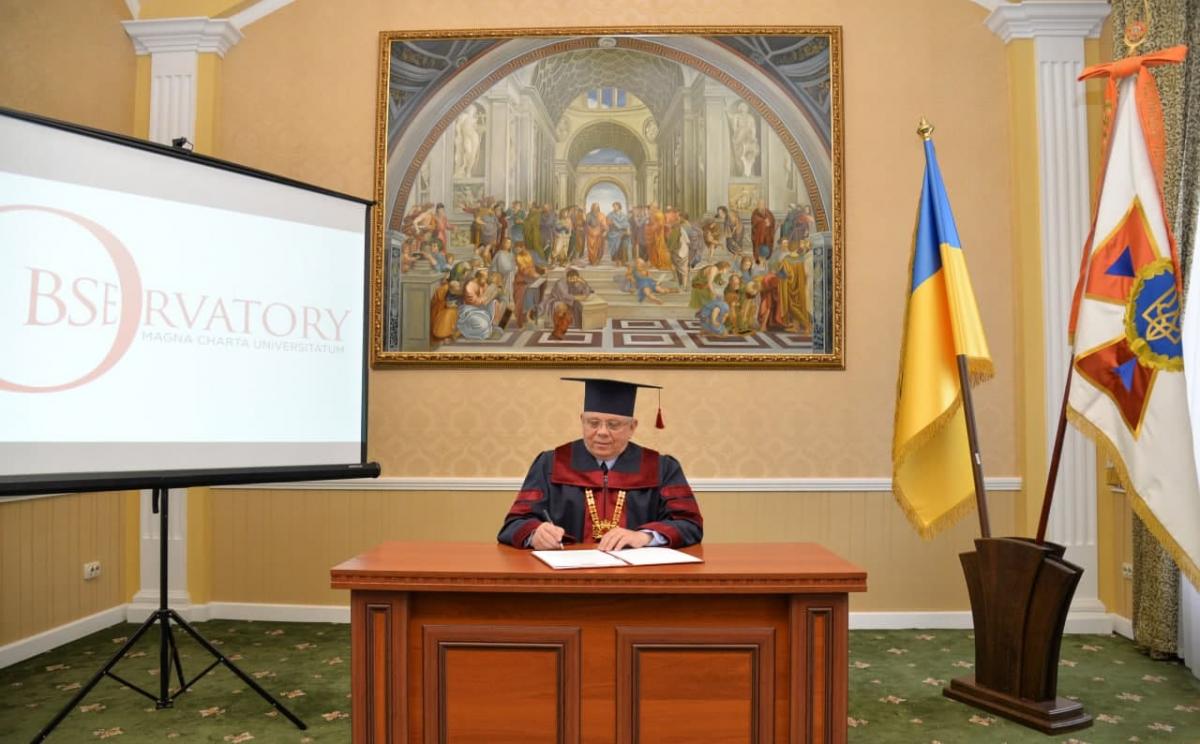
In the traditions of our school, the prerogative has always been and remains the professional training of highly qualified specialists. In total, about 35 thousand specialists have been trained in our educational institution during its existence. A striking example of this is his glorious graduates, 45 of whom became generals. Our school has written heroic pages in the annals of its history, which lasts more than 69 years, preparing a galaxy of highly educated professionals for fire departments and civil defense services. Our graduates, with their conscientious service and hard work, worthily multiply the glorious traditions of their native alma mater. Today, many of them hold senior positions in departments, regional administrations and divisions of the SES of Ukraine, as well as the countries of the former Soviet Union. For selfless work, courage and bravery, our best students have been awarded state awards.
During the years of formation and development of our educational institution, these people created its multifaceted history, with their heart, mind and conscience they multiply its glorious traditions even today. We appreciate our history and the people who created it, but we understand that only hard work today will allow us to write a glorious page in the biography of our school. The ancients said: "Laudamus veteres, sed nostris utimur annis" ("We praise the past years, but we live in the present").


